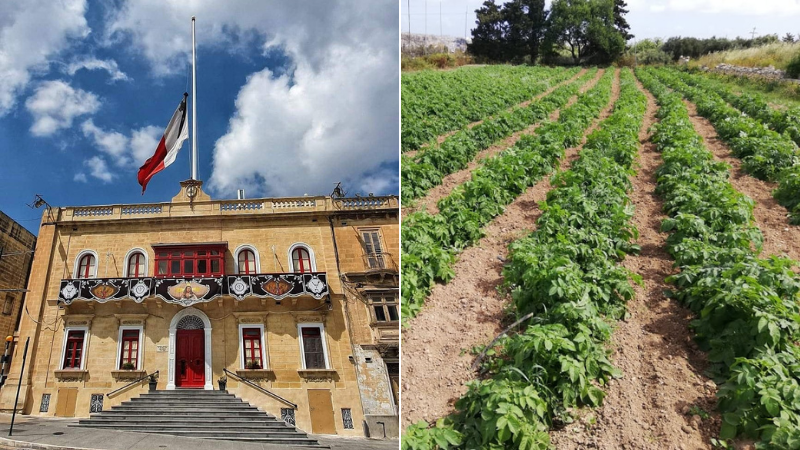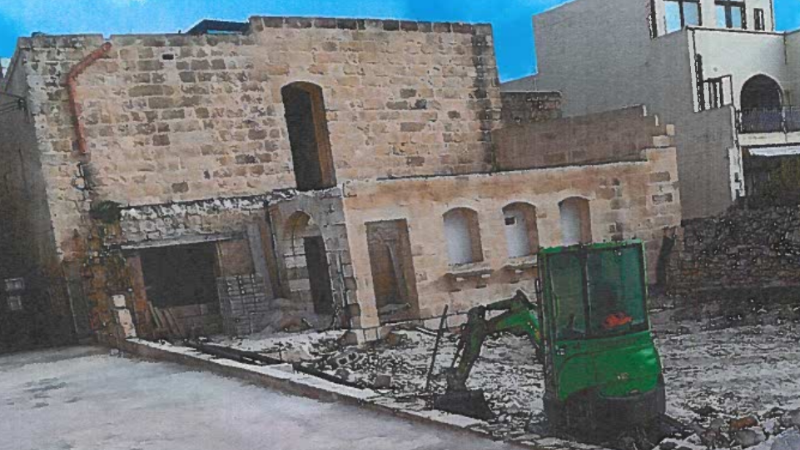Amid rising panic among farmers being faced with eviction from land they’ve cultivated for decades, generations in some cases, politicians, trade unionists and NGOs become increasingly concerned about the implications of this fresh assault on Malta’s countryside, its arable land, and, by extension, the island’s food-production capability.
In what appears to be a clash between two sets of what might be viewed as inalienable rights – the right to enjoy one’s own property versus the right of farmers to continue to pursue their livelihood – the impact of this battle on the whole of Maltese society appears to be sidelined.
Therefore, given the Labour Party’s push to defend pre-1995 rent laws when they were first instituted and how it contrasts to its approach today, The Shift spoke to two ex-Labour stalwarts, former dockyard boss and militant trade unionist Sammy Meilaq and former Labour and PN MP Marlene Farrugia, for their assessment of the situation faced by both farmers and band clubs.
While farmers have been facing evictions since November 2020 following a constitutional court ruling which determined that the Agricultural Leases Act breached the rights of owners to enjoy their property, band clubs have also faced eviction threats that were either averted or catered for through direct government intervention.
Yet the government has taken a completely different course of action in the two situations, offering band clubs a lifeline while failing to offer any assistance to farmers.
Both Meilaq and Farrugia suggested that the government was making a calculated political decision to fail to intervene directly with one lobby while protecting the interests of the other.
Back when the Agricultural Leases Act was first introduced as legislation in 1967, Labour party leader Dom Mintoff was staunchly in favour of the protection of the farmers’ right to workable land. Karmenu Mifsud Bonnici, who later became prime minister, served as legal advisor for the farmers facing disputes at the time.
Asked to weigh in on the changes since then, ex-dockyard boss and militant trade unionist Sammy Meilaq “strongly opposes” both sets of evictions, describing them as “speculative and detrimental not only to the farmers but also to society”.
“Besides, the legal decision by the constitutional court is only an excuse to let the corporate lobby continue to dominate parliamentary democracy in Malta, since if both sides of parliament wanted to, it would only take a few days to amend the Constitution as necessary and hence protect society,” Meilaq told The Shift.
“Parliament will certainly do nothing of the sort, so the only chance for the farmers and NGOs to make some progress would be by direct actions of insubordination,” Meilaq suggested.
Marlene Farrugia, who broke off from Labour’s parliamentary group in 2015 to form a political party named Partit Demokratiku that joined the PN in the 2o17 elections, argued that “politics is shaped by what happens inside band clubs, and football clubs, and boċċi clubs”.
“Band clubs are very useful for politicians, in that sense. I’ve always loved our feasts, so I certainly believe traditional feasts should be supported, especially after COVID and a gradual decline of volunteers. However, it shouldn’t be a matter of supporting the few people who pay for these leases,” Farrugia said.
“What the government should have done is treat everyone equally. Farmers were absolutely and obscenely denied their right to work, and this is because there are a few of them whereas band clubs are in every village and get to decide who gets elected,” she added, maintaining that band clubs use the number of members they have to influence elections within that district by enforcing strict allegiance to the club’s preferred candidate.
Farrugia insisted that the work carried out by farmers is not carried out solely for their private gain but also a benefit for the whole country, reiterating one of the main talking points raised by farmers’ associations. Asked to outline why she believes the government has adopted different approaches with different lobby groups, Farrugia pointed towards the government’s interest in preserving its relations with influential noble families who own much of Malta’s rural countryside.
“Farmers should be given priority – landowners should be compensated for the equivalent of their land with land in another area. The way things stand, it seems there was enormous pressure from certain businessmen, especially those families who own three-fourths of the island,” Farrugia said.
“These people always ensure they are very close with whoever’s governing, and we know for sure that national interest in many cases is being sidelined to maximise profits for private individuals who want to have the upper hand. That shouldn’t be the case. Today’s Labour government has given in to the pressure of a very small percentage of the Maltese population, a decision that will, once again, lead to the destruction of the environment, our culture and traditions, all of which will be irreplaceable,” she added.
‘The haemorrhage continues’
In January, the farmers’ association (Għaqda Bdiewa Attivi – GħBA) and the Malta youths in agriculture foundation (MaYA) flagged an increasing amount of calls from agitated farmers whose leases on the land they were cultivating were being challenged in court, leading to a mass eviction of farmers and an overall decline of the sector.
While the farmers’ association’s pleas for government intervention have so far not resulted in anything barring legal support provided by the government to farmers ensnared in court battles, the government has reacted differently to similar threats of eviction being faced by band clubs holding pre-1995 rent leases, going as far as offering funds obtained from the sales of Maltese passports for the purchase of properties which were leased to band clubs.
“The issue has been pending for a very long period of time. The government could have seen this coming and prevented its escalation to this extent,” president of GħBA Malcolm Borg told The Shift, referring to the evictions brought on after a constitutional court case ruling from November last year decreed that the right to enjoy one’s property was being breached by pre-1995 agricultural rent laws.
“We understand that the government is treading with caution but the issue has now become so urgent that the necessary decisions need to be taken. It cannot continue waiting forever. The issue will not go away and every day that passes, the haemorrhage continues. Speculation is rife, there is a huge feeling of uncertainty in the farming community and the situation has become quite desperate,” Borg added.
Two weights, two measures

The constitutional court’s judgement in November of last year in the case of J&C Properties Ltd v Pulis Nazzareno et al, which ruled that the owner’s right to enjoy property was breached by the Agricultural Leases Act, set a precedent for the ongoing evictions which has not been tackled by the government.
The government’s Agricultural Leases Board, which addresses unsettled disputes over pre-1995 leases, has also ruled in favour of eviction of farmers, in spite of prime minister Robert Abela’s pledge that the government is committed to legal reform which would avoid such evictions. On 5 December, Agriculture Minister Anton Refalo stated that the government is still working on legislation to address the situation, nine months after Abela’s pledge.
This delay jars with the expediency with which the government tackled similar issues for band club leases. In July 2018, a court decision on an appeal that had led to the eviction of one of Paola’s band clubs had prompted then-justice minister Owen Bonnici to state that the government would prevent the eviction from happening while also amending the civil code to provide greater protection from such eviction cases.
The final decision of the court in the Paola band club case, which was taken in March of this year, declared the legal notice to be contrary to fundamental human rights, leaving band clubs in no better position than farmers in terms of protection against eviction.
That changed when, on 20 September of this year, culture minister Jose’ Herrera and parliamentary secretary for citizenship Alex Muscat called a press conference to announce the government’s intent to use the money made from the sale of Malta’s passports to purchase properties from which band clubs were facing evictions.
Featured photo credit – Ian Foks














In France and Italy, farmers took to the street with their tractors. I appeal to the farmers, do the same as this corrupt government is there only for the remaining feudal lords, the corrupt and the assassins. Gvern korrot imexxi mill-korrotti.
Mela sew jien u hija illum mejjet iwritna 2 tomniet raba qbiela. niedu bejnietna ONE EURO U 30CENTS fis sena mal festa ta Santa Marija. Jibatli il ktieb bil posta biex naghmillu l ircevuta. Mela wara li mikteb l l ircevuta niehu photocopy u nibatat il ktieb lil mara ta hija biex tiffirma ukoll. Mela jien min 65cent li imisni tiga infaqt 30cents bolla 10cents envelope u 10cents photocopy (50cents b kollox) jibqali 15cents QLİEH. PROSİT. META MİET HİJA İL MARA TİEGHU KELLA THALLAS SOMMA SEWWA F SUCCESJONİ. DİK GUSTİZZJA EH.
MİN MA GHANDU XEJN FACLİ Lİ JİKKUMENTA.
Ħadd ma qallek li ma ħaqqekx tieħu dak li jistħoqqlok minn artek. Imma allura biex tgawdi int irid ibati ħaddieħor? Ma tagħmilx sens.
U ma nafx għalfejn qed nippuntaw is-swaba’ lejn il-bdiewa meta t-tort huwa kollu tal-gvernijiet inkompetenti li kellna f’Malta.
JİENA MİNİX İNWAHHAL FİL BDİEWA İMMA FL İNGUSTİZZJA TAL GVERNİJİET. U BİEX İNKOMPLİ NGHİDLEK UKOLL DİN İL BİCCA GHALQA İL MA TİNHADEM FUQ SENTEJN. NAHSEB SİD QED JİSTENNA Lİ İNTUH Xİ SOMMA FLUS HA NOHDUWA LURA.
Għandek raġun. Fil-verità nemmen (u nittama li m’għandix raġun) li dan kollu apposta biex l-art agrikola eventwalment taqa’ taħt idejn is-sinjuruni ħa jkollhom iktar ma’ li għandhom.
Qed nerġgħu lura għall-fewdaliżmu qisu.
Kollu tort ta dal gvern ghax lil bidwi jrid jeqirdu, u l odz ghamluha tiswa l flus ghal dik r raguni w kullhadd iggennen! Ghax r rebgha saret kollox! U joseph l korrott kien qalilna li kull ghalqa ma tinhadimx irridu naghmlu business minnha! Pajjiz gabuh mizblaaa!
Hekk hu.
Ghandek ragun imma lanqas hu sew li bidwi ikun ilu jitbghal go l ghelieqi mbad jigu jiehdulu r raba hekk f haqqa t ghajn! Mhux sew!
The farmers should make their voices heard in every possible way before it is too late.